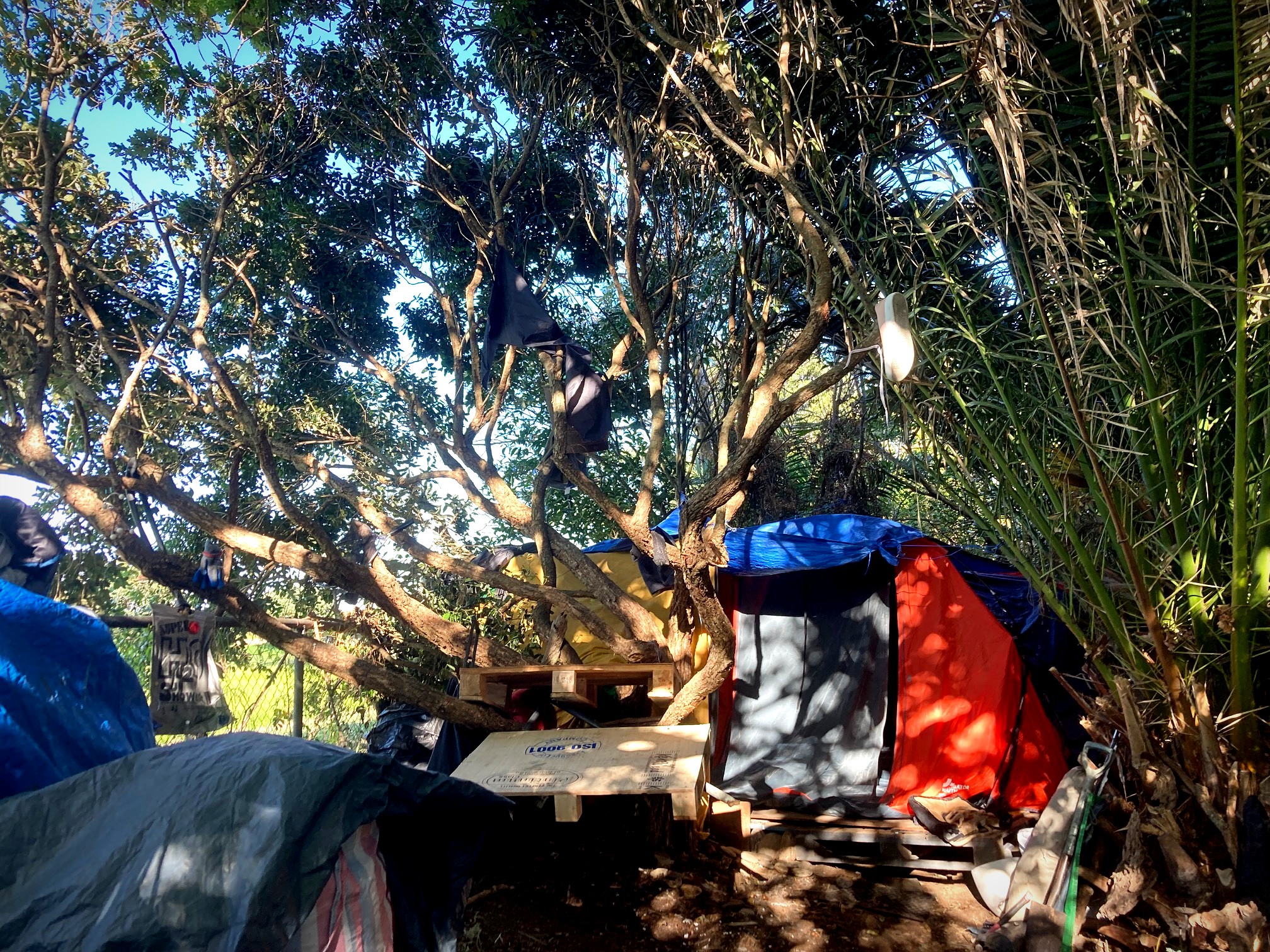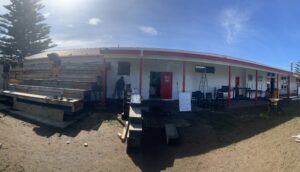There are homeless people living in tents and under tarps in Thames’ Danby Field, 100 metres from a children’s playground set for a $1.5m redevelopment. KELLEY TANTAU looks into the effect it has been having on the community and talks to the residents living rough.
It’s 8am on a Monday and the rain has eased.
It’s a relief for the tent-dwellers adjacent to Danby Field in Thames. When the water comes, so do the rats.
The people there are homeless. They’ve erected tents and tarps, and find food out of dumpsters. They’ve been trespassed from the site in the past but by mid-April, up to a dozen had returned, making – what they say is – “the best of a bad situation”.
The presence of the displaced is known by local police, by the district council, and by the high school that leases the neighbouring field from the Ministry of Education.
They know there are people using the school changing sheds and the public toilets at the playground to sleep in.
They know that the Thames community has a growing concern, too – heightened by the commune’s close proximity to Porritt Park, a playground that has been earmarked for a million-dollar revamp.
“There is a limit to how much we can do,” Thames-Coromandel’s Mayor Len Salt says.
“But council’s not all about wielding a big stick; we want to take a compassionate approach. If people are in serious need or in serious trouble, we’d prefer to find a way to help them through that.”

There are two people at the campsite when The Profile, escorted by local Police, visits the area on April 17. Both are female and are family, and both agreed to speak to The Profile anonymously. They each have a dog; one is four-years-old and chases the rats. The other is a puppy – smaller than the rats.
The first woman apologises for the mess.
She says the council has given her rubbish bags but she hasn’t used them in a while.
There are a few plastic buckets and a spade scattered about, and a shoe hanging from a branch. A small mouse sneaks across the soil.
She tells The Profile that the rodents aren’t the only things to watch out for. There are also white-tailed spiders and the stress of the rain.
“Every time it rains, we’ve got to chuck everything out. All our clothes… it’s upsetting,” she says. “The water comes right up past here, through the whares, and our tent leaks like anything.”
She found the tent in the trash.
There is a second, smaller one on the other side of the metal fence – which now has a gaping hole. She says that one is used for “time out”.
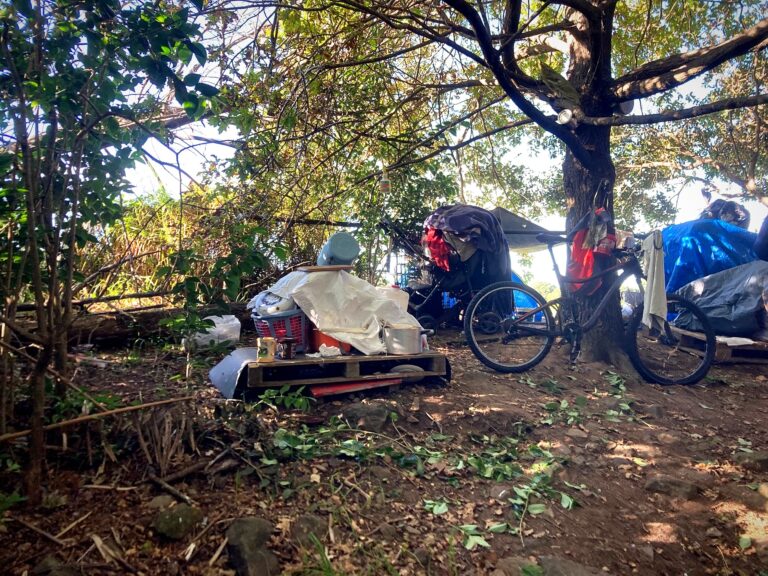
The woman is a “born and bred” Thames local. Ngāti Maru is her iwi.
She’s been living rough for about a year, while others, she says, have been doing it much longer.
Before moving to the campsite, she lived with family and says she hasn’t had a rental “for a long time”. She’d like one though, one she can afford.
“The rent is too dare around here and housing is pretty hard to get,” she says. “If you do get a house, you starve.”
But here, within the mangroves, she and the others “get hungry but manage”.
Every morning, they head to the Thames Baptist Church and have breakfast. They stay there until midday. On Tuesdays, the church offers a community meal and it also provides them with food parcels.
The church is a big help, she says.
Still, court appearances are a regular thing for some.
“I’m going to court for theft, theft, theft,” the woman admits. “Stealing food all the time.
“But I’m pretty lucky because when Pak’n’Save dumps all their food, we eat out of the dumpsters.”
There is a makeshift accessway that crosses the gully between Danby Field and the Goldfields Shopping Centre. This is one quick way for the tent-dwellers to traipse into town.
Mall manager John Freer has heard of them rifling in the rubbish bins.
He has also been to see the residents, but he tells The Profile that he was verbally – and almost physically – intimidated by a man living at the campsite.
He says there’s no easy solution but “something has to happen” to move them along.
“There’s been people living there for… it must be more than six months. At first, there were one or two and they used to come over to Goldfields and charge their phones and that sort of stuff, but now there’s around a dozen in there,” he says.
“And you get people walking around the shopping centre who have got cans of beer in their hands. It’s totally unacceptable that right in the heart of town, we have to put up with that.”
John says his stores, their staff, and the customers that use Goldfields are feeling intimidated, and so he’s contacted council chief executive Aileen Lawrie about the problem.
“We’ve been very tolerant,” he says, “but last week the situation just became unbearable.”
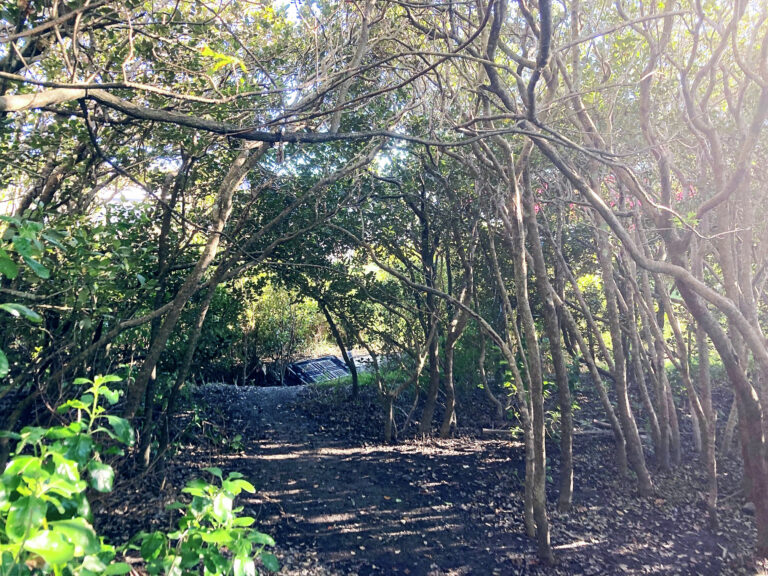
According to Thames Police, local officers first became aware of people sleeping rough at Danby Field about two years ago.
At the time, there were two separate camps established and the area had become a bit of a “dumping ground”.
The tent tenants were trespassed from the property and were given a reasonable time to vacate with their possessions. Police also worked together with the Ministry of Social Development [MSD] and assisted the residents into emergency housing.
The community then arranged a clean-up of the entire park, in which two skip bins of general rubbish and one of recycling were collected, and the area was returned to its natural state.
It was during this initial period that Thames Police was receiving “regular reports” of incidents within – or within close proximity of – the camps.
“These calls would usually be related to anti-social behaviours being witnessed by members of the public, such as intoxicated persons, drinking alcohol, arguing, fighting,” a local police officer says.
“This is still happening occasionally, but is not as frequent and it usually involves other members of the community not residing at the camp directly but loitering in the area also.”
Thames police officers are described by the tent-dwellers as “cool”, and the police themselves say they work with an “eyes wide open” approach, looking at incidents through a wide lens and considering all factors contributing to a particular situation.
“For example, when looking at the situation of homelessness, we need to understand why these people are living rough. We know they are often unemployed and often not receiving the appropriate benefits.
“So, utilising our close partnership with MSD, we now help them through the process,” they say. “Often it’s something as simple as helping them to create a bank account or obtain a birth certificate.”
Police say that the homeless often have underlying health conditions, especially mental health struggles and drug or alcohol addictions. They therefore try to involve partnering agencies such as the Manaki Centre (Thames Mental Health and Counselling service).
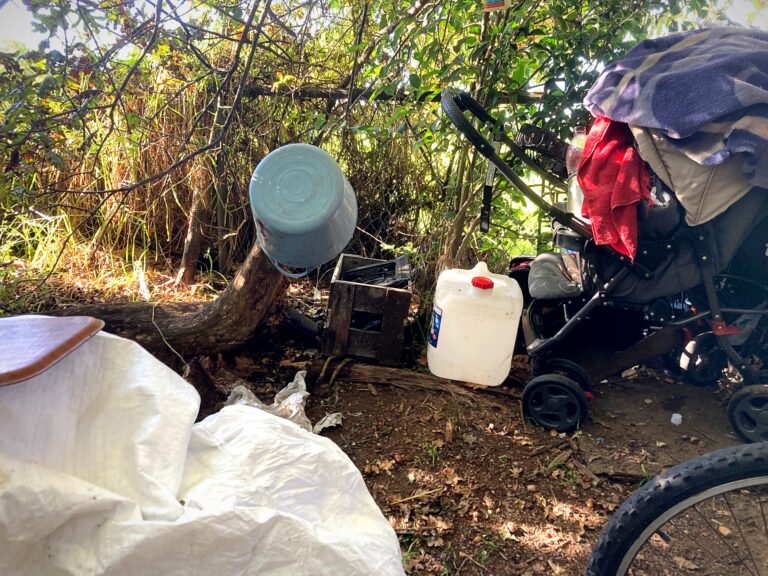
One of the women at the tent site just discovered she suffers from ankylosing spondylitis, an inflammatory disease that, over time, can cause some of the bones in the spine to fuse.
She says she’s been getting “massive headaches”, back pain, and numbness in her legs.
“For two, three years I’ve not known what the hell has been wrong,” she says. “I’m in pain a lot, and I do not like the painkillers they give me – they make me too dopey – and I drink. I’m an alcoholic,” she says.
“I’d rather have a beer than the pills.”
The conversation ends when the woman gets a phone call from the Radiology Department at Thames Hospital. She eventually leaves the site with her dog in tow.
“Some have employment,” the police tell us. “I hear reports they are good, reliable, and hard workers who are just struggling to make ends meet and can’t afford or obtain housing.”
A spokesperson for the Ministry of Housing and Urban Development says it straight: until recently, New Zealand hasn’t been building enough houses.
“The lack of new housing development, coupled with a lack of investment in new infrastructure, has meant that housing supply has not kept up with demand. This lack of housing supply has meant house prices and rents have increased. As a result, housing has become unaffordable for many New Zealanders.
“We see deepening inequalities – particularly for Māori, Pacific peoples, and young people – and too many people living in crowded homes, experiencing homelessness, and in need of support,” they say.
“Against this backdrop of housing shortages and rising rents, homelessness can also be triggered by a range of other issues and has causes that can include family violence, physical and mental health issues, drug or alcohol addiction issues, family and relationship breakdowns and not feeling safe at home.”
The ministry publishes quarterly public housing reports and, in its December report, it found that 2528 people were on the public housing register in the Waikato.
Fifty-five applicants were from the Hauraki district, while 79 applicants were from the Thames-Coromandel.
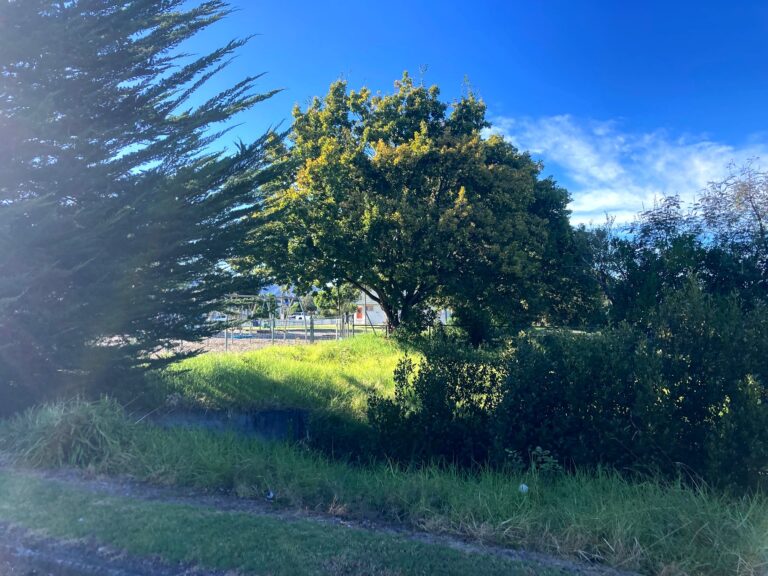
One of the women says she doesn’t want to reside in Thames, that she “wanted out of here” but circumstances haven’t allowed it.
They say that some of them sleep in the public toilets at Porritt Park when it’s cold because there are heaters inside, and that they’ve broken into one of the changing sheds at Danby Field for shelter.
Thames High School tumuaki Michael Hart explains that Danby Field is the property of the Ministry of Education, and that technically, the school leases the land and buildings from the ministry.
The field is rarely used, he says, and is certainly not “a field of first choice”. It’s been utilised only once or twice in the last year because it is low-lying and prone to flooding.
He says the school hasn’t had any run-ins with the tent residents, but they have had rough sleepers occasionally use the school at night.
“We have fortunately not had any direct experience of anti-social behaviour, but we are generally cautious about the presence of people and dogs in the area. [Danby Field is] not a space used by the school on a regular basis, so the chances of contact are reduced.”
Mr Hart agrees that sufficient social services and accommodation would be “great” to meet the needs of the Thames community.
In an ideal world, he says, there would be sufficient, good quality accommodation.
But the tent residents have also drawn attention from the community because of their camp’s close proximity to Porritt Park, which will soon be the site of a $1.5m Destination Playground.
Last year, the district council threw its support behind the project. Where the current playground now sits, there will soon be a revamped space for all ages, as well as a Changing Places toilet facility for people who cannot use standard accessible toilets.
It’s all thanks to an anonymous philanthropic donation of up to $1.5 million.
Thames Police say it’s not ideal for the anti-social behaviours sometimes shown by the tent residents to be witnessed by the local youth, and Mayor Len Salt agrees.
“It is an issue because we need to be reassured that if we’re going to encourage people – especially young people and children – to come and enjoy the playground and use the facilities, that they can do so safely.
“If there’s anything around that area that might put people at risk, then the council has a responsibility to address that. We would want to do so in a firm and fair way,” he says.
“We’d start by talking to the agencies: Police, Ministry of Social Development, and we would get their guidance and ask them for assistance”.
Mayor Salt also says the situation at Danby Field will be included in Porritt Park development conversations going forward.
BY KELLEY TANTAU

